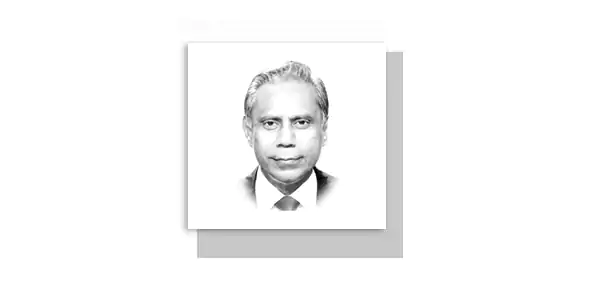ON occasion of the celebrations of the 75th anniversary of the founding of the People’s Republic of China (PRC), President Xi Jinping addressed a reception held at the Great Hall of the People in Beijing. Despite the media’s preoccupation with other international events like the forthcoming US Presidential elections, escalation of the conflict in Gaza and Lebanon and Iran’s missile attack on Israel, there was great interest in Xi Jinping’s speech. The Chinese President emphasized several key themes, which include Peace and Development; Achievements and Future Goals; People-Centric Approach and Global Cooperation.
These themes reflect China’s ongoing efforts to position itself as a leader in global peace and development while ensuring the well-being of its citizens. President Xi reiterated his country’s commitment to promoting global peace and development. He stressed the importance of standing on the right side of history and human civilization, advocating for cooperation and mutual benefit.
In his epoch-making speech, President Xi Jinping highlighted several specific achievements of China over the past 75 years. He emphasized China’s transformation into the world’s second-largest economy, highlighting the significant improvements in living standards and the reduction of poverty. He pointed out China’s progress in various high-tech fields, including space exploration, digital economy, and artificial intelligence. Xi mentioned the extensive development of infrastructure, such as high-speed rail networks, highways, and urbanization projects, which have greatly improved connectivity and quality of life. He also noted China’s efforts in environmental protection and sustainable development, including initiatives to reduce carbon emissions and promote green energy.
In the realm of Global Cooperation, Xi called for respecting diversity, avoiding confrontation, and fostering a new development paradigm. He underscored the importance of multilateralism and worldwide teamwork to address common challenges. Xi highlighted China’s growing role in international affairs, including contributions to global governance, peacekeeping, and international trade through initiatives like the Belt and Road Initiative (BRI). Among the myriad accomplishments recounted by the Chinese President, the one that stands out most conspicuously is the miracle of the elimination of absolute poverty from China. It is imperative to examine China’s success in poverty reduction, which is attributed to several targeted measures.
Prominent amidst them is boosting the economy to create more job opportunities, which was a cornerstone of China’s poverty alleviation strategy, which included promoting industrialization and urbanization to absorb surplus rural labour. Essentially, China relocated millions of people from inhospitable areas to regions with better living conditions and economic opportunities. This facilitated their access to resources and services. The Chinese government provided compensation for economic losses associated with reducing ecological damage, comprising payments to farmers and herders to protect and restore ecosystems. Significant investments were made in improving education in impoverished areas. This encompassed building schools, providing scholarships, and training teachers to ensure that children from poor families had access to quality education.
For poverty alleviation, China implemented subsistence allowances for those unable to escape poverty through their own efforts, encompassing direct financial support and access to basic services like healthcare and housing. Notably, these measures collectively contributed to lifting nearly 800 million people out of poverty over the past few decades. A malaise plaguing the world is global warming. It is heartening that in his National Day speech, President Xi Jinping emphasized China’s commitment to environmental sustainability and ecological conservation, which reflect China’s ongoing efforts to balance economic growth with environmental sustainability and its role in global ecological conservation. The major aspects highlighted by the Chinese President comprise his reiteration of China’s ambitious targets of reaching peak carbon emissions by 2030 and achieving carbon neutrality by 2060. He emphasized the importance of continuing the green and low-carbon transformation in both production and daily life. Xi accentuated the concept of “ecological civilization,” which is central to China’s sustainable development strategy. He called it a major political and social issue that affects the well-being of the public and the mission of the Communist Party of China.
China’s President stressed that environmental protection is not just a national priority but also a global responsibility. He called for international cooperation to address climate change and promote sustainable development. Experts and officials around the world have applauded China’s President Xi Jinping’s latest pledge that the Chinese people will score more remarkable achievements and make greater contributions to the peace and development of humanity. The aspect that touched the heart chords of most analysts—including this scribe—is President Xi Jinping mentioning “putting people first”. This necessitates delving deeper since it demonstrates the humanist character of China’s development model in the pursuit of collective well-being.
Apparently, he was emphasizing the importance of prioritizing the well-being and needs of the Chinese people in all government policies and actions. This concept is central to his governance philosophy and reflects a commitment to improving living standards, i.e. ensuring that economic growth translates into better living conditions, healthcare, education, and social security for all citizens. When Xi talked of inclusive development, he was promoting policies that reduce inequality and ensure that the benefits of development are shared by everyone, especially marginalized and vulnerable groups.
President Xi Jinping stressed the importance of enhancing public participation in decision-making to ensure citizens’ voices are heard and their concerns addressed. He highlighted the need to balance economic growth with environmental protection, aiming to create a healthier and more sustainable living environment for future generations. Xi reiterated the goal of China’s reunification with Taiwan, emphasizing that it is the shared aspiration of the Chinese people. Over the past 75 years, China’s modernization has driven its remarkable achievements, including global initiatives like the Belt and Road Initiative (BRI), which contribute not only to China’s development but also to the progress of other nations, fostering global cooperation and mutual growth.
—The writer, Retired Group Captain of PAF, is author of several books on China.










